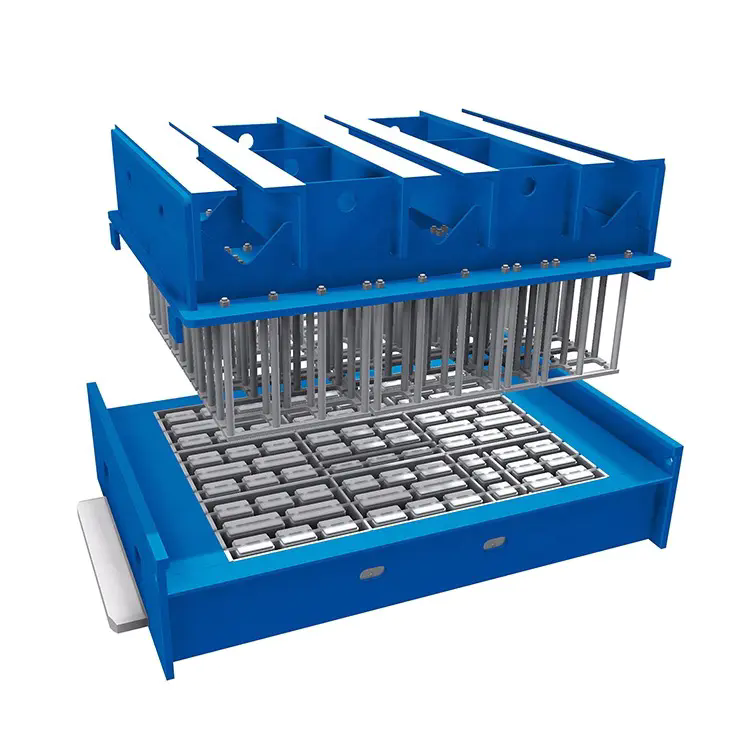Brick Machine Mould: Essential for Efficient Brick Production
2025-03-05
The brick manufacturing process has come a long way with advancements in technology. One crucial element that plays a significant role in ensuring high-quality and uniform brick production is the brick machine mould. These moulds are designed to create the shape and size of the bricks, ensuring consistency and precision. Whether it's for traditional clay bricks, concrete blocks, or modern paving stones, the brick machine mould is indispensable in the production of building materials.
What is a Brick Machine Mould?
A brick machine mould is a specialized tool used in brick production machines to form the raw materials, such as clay, cement, or concrete, into precise shapes and sizes. The moulds are typically made of high-quality steel to withstand the high pressures involved in the brick-making process. The moulds come in different shapes and sizes depending on the type of brick or block being produced.
These moulds ensure that each brick or block produced is of consistent size and shape, which is crucial for ensuring the integrity of the final product. Moulds can also be customized to produce bricks with special features, such as interlocking designs for paving stones or hollow cores for lightweight bricks.
Types of Brick Machine Moulds
1. Clay Brick Moulds
Clay brick moulds are used in traditional brick manufacturing. These moulds are typically used in kilns to produce fired clay bricks. The moulds have specific designs that help shape the bricks, giving them the classic rectangular form. The material is pressed into the mould and fired to achieve a strong and durable product. Clay brick moulds are built to handle the heat and pressure involved in the firing process.
2. Concrete Block Moulds
Concrete block moulds are used to create blocks from cement, water, and aggregates. These moulds are crucial for creating a wide range of concrete products, such as solid blocks, hollow blocks, and interlocking paving stones. Concrete block moulds are designed to be durable and resistant to wear, as the production of concrete blocks involves a high level of pressure.
3. Paver Moulds
Paver moulds are used to create paving stones that are often used for outdoor applications such as driveways, patios, and walkways. These moulds typically come in a variety of shapes, including square, rectangular, and interlocking designs. Paver moulds are usually made from high-strength materials to withstand the pressure and harsh conditions associated with concrete production.
4. Hollow Block Moulds
Hollow block moulds are designed to produce lightweight blocks that are ideal for construction purposes. These blocks are commonly used for building walls and foundations. Hollow blocks are known for their thermal insulation properties, making them ideal for energy-efficient construction. The moulds are created to form the hollow spaces in the blocks, which reduces the overall weight without compromising strength.
5. Fly Ash Brick Moulds
Fly ash brick moulds are used to produce bricks made from fly ash, a byproduct of coal-fired power plants. These bricks are an eco-friendly alternative to traditional clay bricks. Fly ash brick moulds are designed to handle the unique properties of fly ash, which requires a different pressing and curing method. The moulds help create strong, durable bricks with reduced environmental impact.
Importance of Brick Machine Moulds
1. Consistency and Quality
The primary function of the brick machine mould is to ensure uniformity in the shape and size of the bricks produced. This consistency is crucial for construction, where uniform bricks are required to ensure the integrity and strength of the building. Moulds also help maintain the proper thickness and density, which directly impacts the brick’s performance in construction projects.
2. Increased Production Efficiency
Brick machine moulds help increase the efficiency of the brick production process. With the right moulds, brick-making machines can produce large quantities of bricks with minimal labor and time. The precision of the moulds ensures that each brick is shaped correctly, reducing the need for additional handling or adjustments after production.
3. Customization
One of the key benefits of modern brick machine moulds is the ability to customize them for specific applications. Moulds can be designed to produce a wide variety of bricks and blocks, including specialized designs for decorative purposes or bricks with interlocking features for paving. Custom moulds also allow for the production of bricks with unique features, such as hollow cores or textured surfaces, which are often required for modern construction projects.
4. Durability and Longevity
Brick machine moulds are built to withstand high pressure, frequent use, and harsh conditions. The durability of the moulds is crucial for maintaining consistent brick production over time. High-quality moulds made from strong materials like steel or alloy are designed to last for many years, reducing the need for frequent replacements and ensuring cost-efficiency for manufacturers.
5. Cost-Effectiveness
Investing in high-quality brick machine moulds can reduce long-term production costs. Durable moulds minimize the need for repairs and replacements, which can be expensive over time. Additionally, the use of efficient moulds can optimize the brick production process, leading to fewer defects and better-quality bricks, reducing wastage and enhancing profitability.
The Manufacturing Process of Brick Machine Moulds
The process of creating brick machine moulds involves several key stages. First, the design of the mould is developed based on the specifications of the type of brick or block to be produced. The mould is then fabricated using high-quality steel or alloy materials that are capable of withstanding the pressures of brick production.
After fabrication, the mould undergoes several tests to ensure its accuracy, durability, and functionality. Once the mould passes quality checks, it is installed into the brick-making machine. During the production process, raw materials such as clay, cement, or concrete are pressed into the mould to form the desired shape, and the mould is carefully removed once the brick has set.
Maintenance of Brick Machine Moulds
To ensure the longevity and efficiency of brick machine moulds, regular maintenance is essential. This includes cleaning the moulds after each use, checking for any wear and tear, and lubricating moving parts to prevent rust and corrosion. Proper storage and handling are also important to avoid damage to the moulds. Regular inspection and timely replacement of worn-out parts will help maintain optimal performance and reduce downtime in brick production.
Conclusion
Brick machine moulds are a vital component of the brick-making process, ensuring that high-quality, consistent bricks are produced efficiently. Whether for clay bricks, concrete blocks, paving stones, or hollow blocks, these moulds are integral in shaping the future of construction. With their durability, customization options, and cost-effectiveness, brick machine moulds continue to support the demands of modern construction, providing solutions for both traditional and innovative building projects. Proper maintenance and investment in high-quality moulds are essential for businesses looking to stay competitive and deliver reliable building materials to the market.



